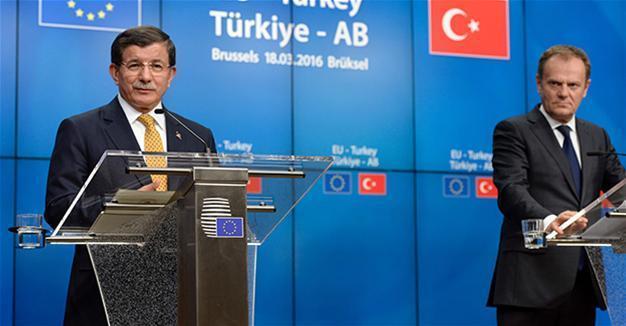Gülenist infiltration into Foreign Ministry ‘intensified after change in personnel policy under Davutoğlu’s rule’
ANKARA

AFP photo
The infiltration of Gülenists into the Foreign Ministry accelerated after a drastic change in the ministry’s personnel policy between 2009 and 2013 under the rule of former Foreign Minister Ahmet Davutoğlu, daily Hürriyet reported over the weekend.
Meanwhile, the ministry also said it had dismissed 30 percent of its staff due to links to the group.
One of the first actions taken by Davutoğlu after he was appointed as foreign minister in 2009 was to submit a draft law to parliament to overhaul the ministry’s structure as well as its recruitment policy and procedures.
The change allowed graduates from the departments of history, sociology, public relations, psychology, philosophy, mathematics and engineering to apply to the Foreign Ministry along with those who studied international relations, law, political sciences and administrative sciences. The changes were accompanied by another change in the examination system. Until 2010, potential diplomats were subjected to a two-stage examination, one written and the other oral. In 2010, a multiple-choice examination was introduced as the first leg of the selection process for diplomats.
This multiple-choice examination was prepared by the personnel department of the ministry which was under the control of Gülen-linked diplomats, especially Tuncay Babalı and Ali Fındık, who are currently in prison on accusations of being members of the Fethullahist Terror Organization (FETÖ), which has been blamed for the July 15, 2016, coup. Babalı served as Turkey’s ambassador to Canada while Fındık was posted to Costa Rica in their final positions.
The personnel department also narrowed the number of senior diplomats who conducted interviews with potential hires. Gürcan Balık, a senior foreign policy advisor of Davutoğlu, was among the interviewers and had an important impact on the selection system. Balık was also jailed after the coup attempt.
30 percent of diplomats ‘linked to Gülen’
In the period between 2010 and 2013, 267 new diplomats were recruited at the ministry, while the total number of recruitments under the Justice and Development Party (AKP) governments between 2003 and 2015 was 595.
Foreign Minister Mevlüt Çavuşoğlu has previously said 350 diplomats were expelled from his ministry following the coup attempt due to links to FETÖ.
“Upon decree laws 667, 672 and 675, 408 persons employed in my ministry were expelled from civil service between July 16 and Nov. 7, 2016. In this frame, 350 personnel in diplomatic careers and 58 employees in other categories were dismissed,” Çavuşoğlu said in an answer to a parliamentary inquiry raised by Sezgin Tanrıkulu, deputy leader of the Republican People’s Party (CHP).
The number corresponds to around 30 percent of all diplomats that were serving in 2016. This proportion also indicates that the Gülenist infiltration into the Foreign Ministry was no different than that into the Turkish Armed Forces (TSK), which has expelled nearly the same amount of personnel since July 2016.
Fewer women diplomats
Another striking finding about the recruitment policy between 2010 and 2013 was the fewer numbers of women diplomats being accepted to join the ministry in comparison with the past. It was also observed that large numbers of graduates from Fatih University, a private institution with strong links to the Gülenist organization, were accepted into the ministry during this period.
It was also observed that the accepted diplomats often possessed insufficient foreign language skills due to the improper selection system, which resulted in the launching of English-language courses at the ministry.
The lack of language skills had reportedly created disturbances at the ministry, leading to suggestions that the selection process was in the wrong hands.
